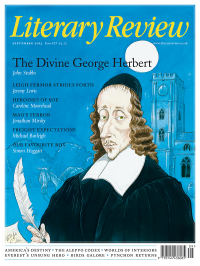James Holland
Under Dark Skies
The Bombing War: Europe 1939–1945
By Richard Overy
Allen Lane/The Penguin Press 845pp £30
Until the appearance of Antony Beevor’s Stalingrad some 15 years ago, big mass-market books on the Second World War tended to be the domain of popular historians and former soldiers but, for the most part, not academics, who remained firmly dependent on university presses and learned journals for the publication of their books and shorter pieces. Although Beevor was not himself an academic, Stalingrad was a watershed because it showed that a book of intricate detail, covering a subject from the war that had nothing to do with either Britain or America and containing stunning new archival research, could sell a bucket-load. As a result, some pioneering studies have reached the general public that in the pre-Stalingrad age might never have been commissioned. These books – I am thinking of Britain’s War Machine by David Edgerton, The Wages of Destruction by Adam Tooze and even Ian Kershaw’s work on Hitler – have all done much to challenge what had become highly entrenched views on the Second World War. It is this reassessment that helps make the war such an enduringly fascinating subject. For all the films and books and articles, there is still much for us to learn.
Reading Richard Overy’s monumental account of the bombing war, I was reminded how high the bar has now been set. Look at a book on Bomber Command published in, say, 1974, and the bibliography runs to a page or two. In Overy’s account, it starts on page 643 and, with

Sign Up to our newsletter
Receive free articles, highlights from the archive, news, details of prizes, and much more.@Lit_Review
Follow Literary Review on Twitter
Twitter Feed
Russia’s recent efforts to destabilise the Baltic states have increased enthusiasm for the EU in these places. With Euroscepticism growing in countries like France and Germany, @owenmatth wonders whether Europe’s salvation will come from its periphery.
Owen Matthews - Sea of Troubles
Owen Matthews: Sea of Troubles - Baltic: The Future of Europe by Oliver Moody
literaryreview.co.uk
Many laptop workers will find Vincenzo Latronico’s PERFECTION sends shivers of uncomfortable recognition down their spine. I wrote about why for @Lit_Review
https://literaryreview.co.uk/hashtag-living
An insightful review by @DanielB89913888 of In Covid’s Wake (Macedo & Lee, @PrincetonUPress).
Paraphrasing: left-leaning authors critique the Covid response using right-wing arguments. A fascinating read.
via @Lit_Review